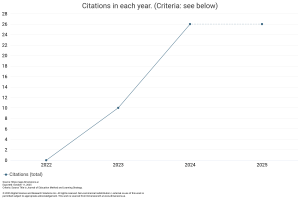Paraphrasing a peer's utterances to develop the students' speaking fluency
DOI:
https://doi.org/10.59653/jemls.v1i03.221Keywords:
Litening, paraphrase, pronunciation, speaking, vocabularyAbstract
The majority of EFL students get stuck in conversation practice. Ten freshmen joined the treatment to correct such a flaw. They equip themselves with equipment connected with stable internet access. The teacher created a whatsapp group to begin the course. He updated the application with the pupils' contacts. The students formed pairs to make the teaching and learning process easier. The teacher gave each duo a URL to click on, listen to, and learn from. They talked about the material's content. After it is over, each group designates a representative to give the discussion's outcome in front of the class. He must also paraphrase his partner's viewpoint. After the presentation, there was a question-and-answer period. The teacher gave the evaluation once all participants had finished performing. The information gathered during the procedure was qualitatively examined. The students' speaking skills improved as a result. The teacher might modify these findings to teach the associated disciplines. It also inspires other researchers to conduct more research.
Downloads
References
Aljohani, N. J., and Hanna, B. E.(2023). ‘I do not know what’s that word in English, but I will tell you about my cousin’: EFL learners’ communication strategies in online oral discussion tasks. The Language Learning Journal 51 (2), 223-237
Amir, R. A., Korompot, C. A., and Baa, S. (2023). A Study on the Effectiveness of Using Digital Material of Podcasts to Improve Students' Speaking Ability. Journal of Excellence in English Language Education 2 (2), 189-198
Astried, A. D., Dewi, S. U., and Prasetyo, W. (2023). The Use of Clustering and Paraphrasing to Teach Reading for General Communication. LinguA-LiterA: Journal of English Language Teaching Learning and Literature 6 (1), 11-17
Babajanova, K. I., and Babajanova, N. X. (2023). CHALLENGES AND POSSIBLE SOLUTIONS OF TEACHING ENGLISH PRONUNCIATION AS A SECOND LANGUAGE IN UZBEK CLASSES. Academic research in educational sciences 4 (3), 459-465
Banister, C. (2023). Exploring peer feedback processes and peer feedback meta-dialogues with learners of academic and business English. Language Teaching Research 27 (3), 746-764
Chen, C. Y., et al. (2023). Facilitating EFL learners’ active behaviors in speaking: A progressive question prompt-based peer-tutoring approach with VR contexts. Interactive Learning Environments 31 (4), 2268-2287
Dewi, Y. P. (2023). Improving Students' Speaking Ability in Expressing Opinion through Think Pair Share: English. Journal of English Development 3 (01), 29-37
Fadilla, S., Safitri, L., Sakti, G., and Syahrul, S. (2023). THE EFFECT OF INTRODUCING SUPRASEGMENTAL FEATURES TOWARDS STUDENTS LISTENING ABILITY. ELP (Journal of English Language Pedagogy) 8 (2), 247-261
Ha, X. V., and Murray, J. C. (2023). Corrective feedback: Beliefs and practices of Vietnamese primary EFL teachers. Language Teaching Research 27 (1), 137-167
Hegazy, H., et al. (2023). Working from theory: Developing the bases of teachers’ critical thinking pedagogies through action research. Educational Action Research 31 (1), 78-93
Ibodullayeva, Z. (2023). THE MAIN DIRECTIONS OF DEVELOPING STUDENTS SPEECH IN NATIVE LANGUAGE CLASSES. Молодые ученые 2 (11), 85-92
Kannan, M., and Meenakshi, S. (2023). A Critical Overview of the Implementation of Language-Immersion Through the Use of Mobile Apps. Theory and Practice in Language Studies 13 (1), 186-191
Kurd, S. A., Hassan,S., and Iqbal, A. (2023). EXPLORING EFFECTS OF MOBILE APPLICATIONS ON ENGLISH VOCABULARY LEARNING AND ACQUISITION. Pakistan Journal of Social Research 5 (02), 17-25
Meldia, P., & Melani, M. (2022). STUDENTS’ PERCEPTION IN USING DEBATE TECHNIQUE TO DEVELOP STUDENTS’ SPEAKING SKILLS. ELP (Journal of English Language Pedagogy), 7(2), 16-29. https://doi.org/10.36665/elp.v7i2.625
Mukhtorova, B., and Akhmadjonova, M. (2023). THE EFFECTIVE WAYS OF IMPROVING STUDENTS SPEAKING SKILLS. THE ROLE OF SCIENCE AND INNOVATION IN THE MODERN WORLD 2 (4), 61-64
Nematova, Z. (2023). THE METHODS OF DEVELOPING LOGICAL THINKING USING AUTHENTIC MATERIALS IN THE CLASSROOM. hnology 3 (3), 183-188
Nurmukhamedov, U., and Sharakhimov, S. (2023). Corpus-based vocabulary analysis of English podcasts. RELC Journal 54 (1), 7-21
Ramli, R., Rosmayanti, V., and Fansury, A. H. (2023). BRINGING TECHNOLOGY INTO THE CLASSROOM: STUDENTS EFFORT TO SHAPE PRONUNCIATION. The Journal of English Literacy Education: The Teaching and Learning of English as a Foreign Language 10 (1), 25-36
Sari, F. M., and Safitri, T. (2023). UTILIZING WHATSAPP APPLICATION AS A LEARNING MEDIA IN THE ONLINE ENGLISH CLASS. Journal of Research on Language Education 4 (1), 29-34
Yasmiatun, Y. (2023). Students’ Attitudes toward the Use of Podcast as Digital Material in EFL Classroom. Linguistic, English Education and Art (LEEA) Journal 6 (2), 209-221
Downloads
Published
How to Cite
Issue
Section
License
Copyright (c) 2023 Edy Suseno

This work is licensed under a Creative Commons Attribution-ShareAlike 4.0 International License.
Authors who publish with this journal agree to the following terms:
- Authors retain copyright and grant the journal right of first publication with the work simultaneously licensed under a Creative Commons Attribution-ShareAlike that allows others to share the work with an acknowledgement of the work's authorship and initial publication in this journal.
- Authors are able to enter into separate, additional contractual arrangements for the non-exclusive distribution of the journal's published version of the work (e.g., post it to an institutional repository or publish it in a book), with an acknowledgement of its initial publication in this journal.
- Authors are permitted and encouraged to post their work online (e.g., in institutional repositories or on their website) prior to and during the submission process, as it can lead to productive exchanges, as well as earlier and greater citation of published work (See The Effect of Open Access).
























